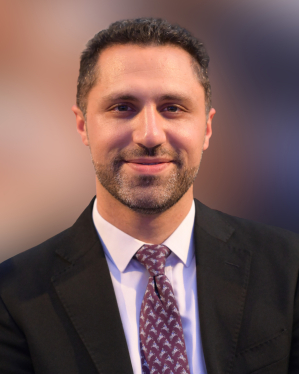The Arab Baptist Theological Seminary (ABTS) in Beirut marked a historic leadership transition on Sunday (September 28), as Wissam Nasrallah officially assumed the presidency, succeeding longtime leader Dr. Elie Haddad. At the passing of the baton ceremony, Nasrallah outlined a vision centered on worship, Scripture, critical thinking, and servant leadership as the seminary enters a new missionary season in the Middle East and North Africa.
Addressing faculty, students, alumni, and local church leaders, Nasrallah spoke with “humility, gratitude, and a sense of holy fear,” acknowledging the weight of responsibility and privilege of leading an institution that has served the Arab Church since 1960.
“We are here not only to mark a transition in leadership, but also to remember that ABTS belongs to the Lord,” Nasrallah said. “It is His work. His mission. His home. We are the stewards entrusted with the gospel.”
Nasrallah pays homage to his predecessor Haddad, who led ABTS for 19 years through Lebanon’s economic and political crisis, a global pandemic, and a major transition in theological education. “Under his leadership, ABTS has become a pioneering educational institution, respected not only in the Arab world but internationally,” Nasrallah said. “You’ve done more than just manage change. You’ve cultivated a legacy of fidelity.”
The Board of Trustees announced Nasrallah’s appointment in December 2024 following a “comprehensive and prayerful process.” The board praised his “deep dedication to God, visionary leadership, and passion for advancing ABTS’s mission.”

Previously, he served as CEO of LSESD – Thimar, the parent organization of ABTS, and as part of the seminary’s leadership team, Nasrallah brings both institutional knowledge and regional perspective. His appointment officially took effect on October 1st.
In his inaugural address, Nasrallah anchored his vision on Psalm 127:1.
“Without Christ as the cornerstone, our innovations, strategies, and even technology are in vain,” he said. “Our calling in this new season is clear: to form a generation of biblically grounded critical thinkers and lifelong learners and worshipers grounded in servant leadership that reflects Christ himself.”
Nasrallah expanded on his four-fold vision and began with worship as the starting point for his theological formation. “True formation begins with reverence, awe, and joy in the knowledge of God,” he said, drawing from Jonathan Edwards’s account of “holy affections” and drawing a warning against emotional fervour, divorced from understanding.
“As light heats up, understanding should kindle worship and worship,” he said. “Even if your classes move online, technology is a tool, not a threat. It allows you to reach unreached leaders and train leaders in the context of your ministry.”
Turning to the Bible, Nasrallah emphasized ABTS’ commitment to the authority of the Bible. “A solid foundation in the inspired, trustworthy, infallible, and authoritative Word of God is not clinging to certainty out of fear,” he said. “It is to be anchored in the unchanging character of God as revealed in His Word. This foundation does not silence our questions; it gives them direction.”
Founded to serve the church in the Middle East and North Africa, ABTS continues to equip pastors, teachers, and ministry leaders around the Arabic-speaking world. Nasrallah said that in a time of “ideological confusion, disinformation, and digital overload,” seminaries must form leaders “who can engage the culture without conforming to it.”
“We need leaders who think theologically, critically and contextually, who can speak gospel truths to complex realities with clarity and conviction,” he said. “By the time our students complete their studies, they will find that they have only begun to scratch the surface of God’s truth. They will graduate not in all things, but as lifelong learners, ready to continue learning, learning, and being reshaped by God’s Word.”
Servant leadership is the ultimate goal of ABTS’ mission, Nasrallah said.
“Servant leaders don’t build followers; they develop successors,” he said. “They listen well, collaborate broadly, and faithfully disciple disciples. They courageously speak truth, serve sacrificially, and shepherd prophetic vision in turbulent times.”
Describing ABTS as an “outpost of the kingdom,” Nasrallah emphasized that seminary graduates are not confined to the classroom or the pulpit. “Our graduates preach and serve in refugee camps, plant and counsel urban churches, become peacemakers in war zones, and testify in hidden places where no one sees,” he said. “Their classrooms may be in tents, basements, and homes. Their pulpits may be on broken streets, prison cell phones, and unjust systems.”
Despite the uncertainty facing the region, he concluded with confidence in God’s faithfulness. “We don’t know what the future holds, but we know the one who holds it, and he is faithful.
ABTS, founded in 1960, is a ministry of Thimar – Lsesd, serving the church in the Middle East and North Africa by providing theological education, pastoral formation, and ministry training. Its vision is to “see God glorified, people reconciled, and communities restored through the church in the Arab world.”
Under Nasrallah’s leadership, ABTS aims to continue its mission by “equipping faithful men and women for effective service” through residential and online programs that integrate theology, culture, and ministry practices.
“As we build on what has been entrusted to us,” Nasrallah said.
